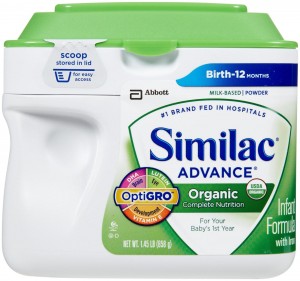 Top Class Action Lawsuits
Top Class Action Lawsuits
Heads Up New Parents…Organic Similac not so organic—according to a consumer fraud class action filed against Abbott Laboratories, the maker of Similac infant formula food. The lawsuit alleges the label stating the food is organic is false and misleading because the formula isn’t actually organic.
Filed by Sara Margentette, Matthew O’Neil Nighswander and Ellen Steinlien in U.S. District Court in New York, the Similac lawsuit alleges Abbott’s Similac Advance Organic Infant Formulas contained ingredients that are prohibited in organic foods.
According to the complaint some 26 of the 49 listed ingredients are not allowed in organic food. The suit states the ingredients were “irradiated substances, synthetic compounds, or produced from hazardous substances.”
The plaintiffs claim Abbot described the Similac Infant formula as organic in order to persuade consumers to purchase it, thereby increasing its sales and profits.
“As a result of its false and misleading labeling, Abbott was able to sell its ‘Organic’ Infant Formula to hundreds of thousands of consumers throughout the United States and to realize sizeable profits,” the lawsuit states. Plaintiffs are seeking class certification and more than $5 million in damages plus court costs.
The case is United States District Court for the Eastern District of New York case number 1:15-cv-2837.
JC Penny Nailed re: its Sales? It’s another consumer fraud class action lawsuit for JC Penney over its alleged practice of artificially inflating merchandise prices only to mark them down to create the appearance of a “sale” price. According to the lawsuit, the retail chain’s pricing practices are equivalent to deceptive and fraudulent advertising.
The JC Penney class action was certified last week, and accuses the national retail chain of operating a “massive, years-long, pervasive campaign” to deceive shoppers about its pricing for private-label brands, and for outside brands such as Liz Claiborne, sold exclusively by JC Penny.
The lawsuit states that Cynthia Spann, lead plaintiff in the class action, discovered the deceptive advertising practices after buying three blouses for $17.99 each, a 40 percent discount from the “original” $30 price, only to learn the price was never above $17.99 at any point during the prior three months.
The case is Spann v. J.C. Penney Corp et al, U.S. District Court, Central District of California, No. 12-00215.
Top Settlements
Another Overdraft Fee Class Action is…Over! You gotta love this! Capital One Bank NA has to pony up $31.8 million as settlement of a lawsuit that alleged the bank manipulated its overdraft fees. Approved by US District Judge James Lawrence King, the settlement fund of $31.76 million represents 35 percent of the most damages plaintiffs could expect to recover at trial.
The Capital One overdraft fee lawsuit has taken nearly five years and the class consists of roughly 611,000 members. Capital One tried three times to have the lawsuit thrown out. It alleged that the bank deducted money from customers’ accounts based on the size of their transactions, not in chronological order, thereby maximizing the amount of overdraft fees it charged.
For settlement class members who do not opt out, prorated shares from the settlement fund will automatically be sent to them. Capital One’s data was used to determine which account holders were harmed by the high-to-low posting practice.
The case is In re: Checking Account Overdraft Litigation, case number 1:09-md-02036, in the U.S. District Court for the Southern District of Florida.
Hokee Dokee—That’s a wrap folks…See you at the Bar!




